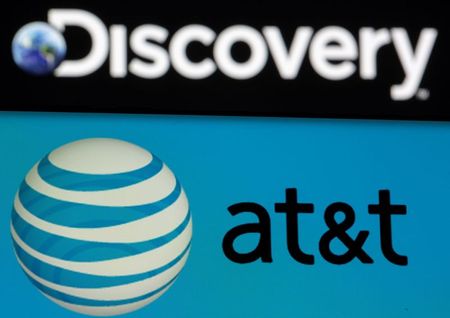By Kenneth Li and Subrat Patnaik
(Reuters) – AT&T, owner of HBO and Warner Bros studios, and Discovery, home to lifestyle TV networks such as HGTV and TLC, said they will combine their content to form a standalone global entertainment and media business.
Discovery Chief Executive David Zaslav will lead the proposed new company, which will comprise one of Hollywood’s most powerful studios, including the Harry Potter and Batman franchises, news network CNN, sports programming and Discovery’s unscripted home, cooking and nature and science shows.
Monday’s move marks the unwinding of AT&T’s ambitious plan to forge a telecoms and media powerhouse through a flurry of deals including the 2018 $108.7 billion acquisition of U.S. media conglomerate Time Warner and the 2015 purchase of satellite TV service DirecTV for $68 billion.
Shares in Discovery climbed about 16% to $41.3 in premarket trade but later fell 2% as investors digested that it would take time for Discovery to scale up in streaming, Rich Greenfield, partner at LightShed Partners, said.
“This company is going to take a year to be in position to take control of the assets,” he said. “The new company will be better after the deal, but it will take time.”
Shares in AT&T rose about 3% to $33.23 after the announcement of the new company, which will be 71% owned by AT&T shareholders and 29% by Discovery investors.
AT&T said it will use the $43 billion proceeds from the tax-free spin-off of its media assets to pay down its more than $160 billion of debt.
The telecoms giant also said it planned to cut its dividend payout ratio, which is the percentage of earnings paid to shareholders in dividends, to the low 40% range, down from around 60% in the previous quarter.
The enterprise value of the new combined company will be more than $120 billion, carrying $58 billion in debt, including $43 billion from WarnerMedia and $15 billion from Discovery.
The name of the new company will be disclosed by next week, while other details, including the future role of WarnerMedia CEO Jason Kilar and how the combined properties and services will be arranged, have yet to be worked out, executives said on a call with reporters.
The deal underscores the movement of TV viewership to streaming, where scale is required to take on the likes of Netflix Inc and Walt Disney Co.
“The opportunities in direct to consumer streaming are rapidly evolving, and to keep pace and maintain a leadership position, several things are required – global scale, access to capital, a broad array of high quality content and industry best talent,” AT&T Chief Executive John Stankey told a news briefing.
Combined the company will spend about $20 billion on content, more than the $17 billion Netflix will spend this year, and Zaslav said he expected to increase programming investment in the future.
“While further details have yet to emerge, the proposed horizontal combination would create a global content behemoth uniting WarnerMedia’s premier news and entertainment assets with Discovery’s industry-leading cache of non-scripted programming networks,” Keith Snyder at CFRA Research said.
The deal is not surprising, Snyder added, after pressure on traditional pay-TV ramped up during the coronavirus pandemic as consumers binge-watched streaming shows while stuck at home.
With Time Warner, former AT&T Chief Executive Randall Stephenson sought to create a media and telecoms giant, combining content and distribution.
This proved a costly strategy as AT&T simultaneously sought to expand next generation wireless services, most recently spending $23 billion to buy more spectrum.
TELCO TURNAROUNDS
AT&T is not the first telco to shed its media assets.
Verizon Communications Inc announced plans on May 3 to drop its media businesses, which include Yahoo and AOL, for $5 billion, ending an expensive and unsuccessful run in the media and advertising world.
AT&T and Discovery’s new combined venture is projected to have 2023 revenue of about $52 billion and adjusted EBITDA of about $14 billion.
The deal is anticipated to close in mid-2022, pending approval by Discovery shareholders and regulatory approvals.
The new company is expected to see $3 billion in cost synergies and has no plans to sell any assets.
LionTree and Goldman Sachs advised AT&T, while Allen & Company and JPMorgan advised Discovery. Perella Weinberg advised the independent directors of Discovery.
(Reporting by Kenneth Li in New York and Subrat Patnaik in Bengaluru; Additional reporting by Sheila Dang and Eva Mathews; Writing by Anna Driver; Editing by Steve Orlofsky and Alexander Smith)





